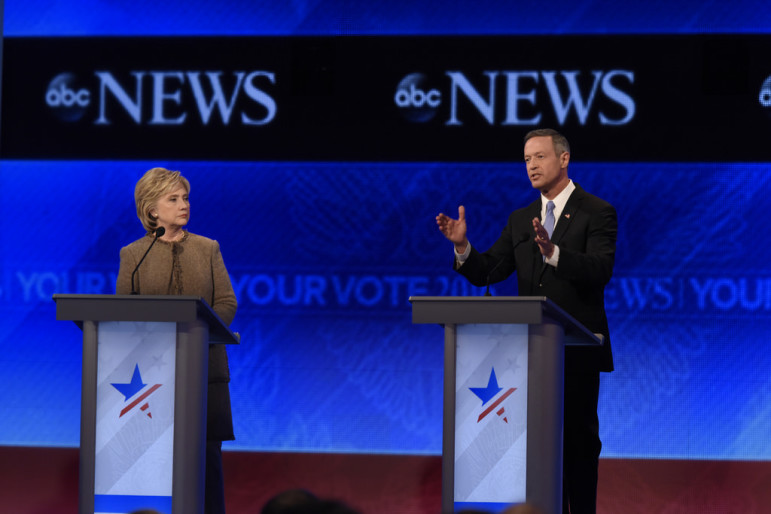By Len Lazarick
‘Twas the Saturday night before Christmas, and all through the nation, few creatures were watching the Dem confrontation.
Remember back in August when Martin O’Malley was loudly protesting how few debates the Democratic Party was planning and how bad their timing was? This viewer-suppression schedule — an even duller Saturday Night Live without the skits or music — wasn’t good enough to diss the contenders for Hillary Clinton’s throne.
Watching the first half of Saturday’s debate in drowsy boredom, it seemed that O’Malley was being kept at the kid’s table, treated like the GOP undercard with half the time.
Sure enough, the figures compiled by Graphiq in the chart below confirm that impression. Hillary Clinton got 55% more speaking time than O’Malley and 26% more time than Bernie Sanders. Just three people on the stage, and the two moderators wouldn’t let O’Malley break in with a little contentiousness — although his “I-already-did-that-as-governor” shtick is playing as poorly as it is among the Republican governors (and ex-governors) running for president.
The growth in Twitter followers and Google search trends in the other graphs further below show O’Malley’s lack of a bump from the debate. In Google’s searches, he was almost flat-lining. How long before he pulls the plug? In what early primary state can he even come in second?
I turned the TV off at 10 p.m. Rick Vatz, a conservative commentator, watched the whole thing, and his observations follow.
Feel free to add your own comments at the bottom, but only if you actually watched the debate. Gratuitious bashing of O’Malley or the others without having paid price of admission by enduring the debate will be deleted.
Unsuspenseful, solid questioning, little disagreement, lots of bashing Trump, GOP
By Richard E. Vatz
For MarylandReporter.com
The suspenseful context for this otherwise unsuspenseful debate was that a revealing kerfuffle had been transpiring wherein the Democratic National Committee (DNC), deniably controlled by Hillary Clinton, punished Bernie Sanders — a Democrat only as of this year — for having a staffer (subsequently fired) who tapped into Mrs. Clinton’s voter data base, by denying his campaign’s accessing critical voter information necessary to raise money.
In response, he has sued the DNC, claiming unfairness. The fight left many Democrats incredulous, wondering why Clinton supporters would contribute to an unnecessary rift.
This narrative is written in the past tense because as the issue was quasi-vetted on stage, Sanders abjectly apologized and Clinton accepted it and they both indicated that they were satisfied with the apparent resolution and did not discuss it further. How nice.
According to ABC’s George Stephanopoulos, Clinton’s people were talking to him about the Sanders campaign’s having committed a serious crime, theft, but they agreed that any punishment should be suspended.
Pursuing unanswered questions
ABC’s David Muir and Martha Raddatz were the major questioners, and the latter was excellent, while the former, in trying to enforce the unclear rules of the debate, often spoke simultaneously with candidates for what seemed like minutes, before yielding each time to the candidates.
Raddatz pursued unanswered questions with firm follow-ups without being rude and asked many questions usually left unasked, such as questioning Clinton about her questionable Libyan policies and pushing her on her failures. She didn’t specifically grill Clinton on her Benghazi actions, to be sure, but overall Raddatz was one of the best questioners we have had at a Democratic debate. More probing about President Obama’s passivity in foreign policy and if or how such un-involvement would change would have been welcome.
Foreign policy, economy, gun control, Trump
On foreign policy, all candidates rejected United States leadership in sending American troops to defeat ISIS, while the only major difference was between Clinton and Sanders in whether to simultaneously go after Syria’s President Bashar al-Assad and ISIS. The sanguineness of all candidates, especially Clinton, with the progress of the war was stunning, to say the least.
On the economy, none was as socialistic as the socialist Bernie Sanders — the greed of Wall street is “destroying our country” — and at least Clinton spoke up for small business.
Clinton pledged not to raise taxes on the middle class, while Sanders, as interpreted by
George Stephanopoulos, claimed he would make no such promise but that any raises would yield social benefits.
On gun control, O’Malley crisply and devastatingly attacked Sanders for his weakness, including his rejection of the Brady bill and Clinton for her multiple flip-flops. Clinton acted appalled. but never confronted the contradictions ascribed to her.
All candidates implied that Donald Trump represents evil incarnate and also represents the Republicans. All three candidates cited the most radical positions of any Republican candidate, and claimed they were, again, prototypical of Republican thinking. Throughout the debate Trump personified the Republican Party for these Democratic candidates, and each would love to have him be the Republican nominee, as it would guarantee victory for the Democrats’ nominee.
O’Malley’s strongest moment was his tribute to his wife Katie, who, he outlined, perfectly personifies the ideal characteristics of a 2015 professional woman, wife and mother.
Articulate, attractive performances by all candidates, with the lingering elephant in the room of failed foreign policy and economic policy by their party’s president.
Professor Vatz teaches political persuasion at Towson University.






Richard Vatz is a right-wing talk show regular. His last line shows his bias. Are we better off now than we were under Bush. You bet we are. I don’t see the President as having “failed” economic policies. Unemployment way down. Expanded health coverage. Remember when we were told that Obama would leave us with $10/gallon gas? If you are going to have a critique of these debates, at least have a representative of both parties weigh in on them.